Our top picks for climate conscious wines.
Table of Contents
After a long day poring over your plans for an eco-friendly prefabricated home or contemplating environmentally conscious carpeting, you might want to settle in with a glass of biodynamic, organic, sustainable wine.
What are the best sustainable wines to be aware of this year?
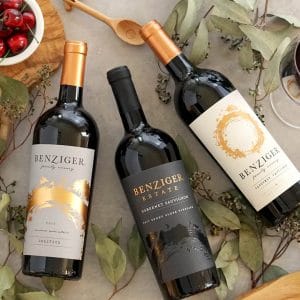
Our top pick for sustainable winery
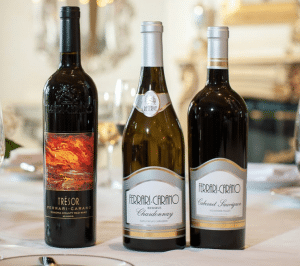
Family owned, CSWA certified winery
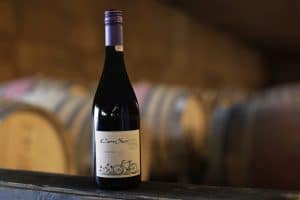
A carbon neutral winery making good wines
In short, there’s no single body stamping a sustainability label on wine, meaning that a variety of certifications have popped up, along with some downright sneaky labelling tricks aiming to fool wine lovers.
We’ll look at these in a moment, but first, here are my top picks for 5 of the best sustainable wines you can buy right now. You can read about our unique research process here.

Benziger Family Winery (Overall Winner)
Highlights: Demeter Biodynamic certified winery big on biodiversity, solar energy, water conservation, and other sustainable strategies for winemaking. All wines have been certified organic, sustainable, and/or biodynamic since 2006!
Benziger Family Winery was founded in 1980 and takes a Biodynamic, organic, and sustainable approach to tending vineyards and making wine. This means enhancing and maintaining biodiversity with carefully constructed wetlands that filter water and offer habitat for a multitude of species. The winery has recycled millions of gallons of water and, in addition to water conservation, Benziger generate electricity using solar panels and use energy efficient equipment in their wineries.
Based in an old volcanic bowl in Sonoma, California, this family wine business knows all too well the impact of climate fires on local residents and the local economy. Indeed, the 2017 wildfire burned through one of the company’s wineries and climate change has forced Benziger to use shade cloth to protect the vines from sunburn.
Benziger has also led the way in helping others in the wine industry to take greater steps towards sustainability. This includes creating a third-party certified-sustainable vineyard program with the help of Stellar Certification Services and CCOF (California Certified Organic Farmers), through which Benziger has helped winegrowers achieve certified sustainable and certified organic status, as well as certified Biodynamic status.
This winery emphasizes environmentally sound growing methods, such as biodiversity, soil revitalization and Integrated Pest Management (IPM). All four of the Benziger estate vineyards are Demeter-certified Biodynamic, having begun the transition themselves in the mid-nineties and achieved certification in 2000. This means there are no synthetic chemicals and that the vineyards operate with a closed nutrient system, relying on composting, natural predator-prey relationships, and a genuine love for sustainability.

Ferrari-Carano
Highlights: Family-owned CSWA certified sustainable winery focused on world-class winemaking, biodiversity, energy efficiency, water conservation, and good employment practices.
Ferrari-Carano has been CSWA certified sustainable since 2015 and was awarded Sustainable Producer/Maker of the Year at the 2019 Sonoma County Harvest Fair. The winery, located in Sonoma County’s Dry Creek Valley has been practicing sustainable winegrowing practices for years was the first winery to release wines bearing the ‘Sonoma County Sustainably Farmed Grapes’ label.
With its origins in a 30-acre plot of grapes bought in 1979, the company now encompasses 24 certified sustainable estate vineyards totally 1,400 acres. Thought Ferrari-Carano has grown in size, their goal to make world-class wine while being good neighbors, good employers, and good stewards of the land hasn’t changed.
The vineyards are carefully managed with water use efficiency, soil and nutrient management, a trellis system and canopy management, integrated pest management, biodiversity and wildlife conservation in mind. The company also pays attention to energy efficiency and greenhouse gas mitigation, human resources and fair labor practices, and soil waste management. This strategic approach involves the use of 19 million gallons of recycled water to carefully irrigate vineyards in such a way as to reduce evaporation and water run-off. The company also uses wind machines which help save an estimated 23.5 million gallons of water.
As for the soil, Ferrari-Carano uses strategic cover crops to add nutrients, builds up soil naturally with worm castings and liquid compost, and uses discarded grape stems as mulch. They also maintain olive tree orchards, wildflowers, and herb gardens to encourage healthy soil and biodiversity, encouraging natural pest management by attracting advantageous insects like bees, ladybugs, and butterflies.
Since 2015, Ferrari-Carano has maintained 560 acres of certified Fish Friendly Farming land and has participated in restoration projects to support the health of the Russian River, Dry Creek and Dutcher Creek. The vineyards also installed hawk perches and owl boxes, as well as insectary gardens with drought tolerant plants.
One fun feature at Ferrari-Carano’s vineyard ranches is their innovative use of tree sap road paving! Instead of the typical asphalt, gravel, and concrete, the company uses lignin sulfonate, a by-product of pulpwood processing, in combination with crushed rock excavated from their own land to pave the roads. This helps to suppress dust and is biodegradable, meaning no toxic run-off.
The vineyards also host cows and sheep as part of their closed-loop approach. Specifically, they have Baby Doll sheep grazing in the vineyards where the sheep (an ancient breed that grows only to two feet in height) can’t reach the grapes but do take care of the grass and weeds below. This is a win-win for the winery, with the sheep helping to eliminate the need for pesticides and artificial fertilizers all in one.
Ferrari-Carano also built a new production building in 2017 that met Cal Green requirements. This building is energy efficient and has the potential for solar panels to be added in the future.
Ferrari-Carano provides rent-free housing for more than 100 vineyard employees, has a wellness program for staff, and takes an active role in firefighting in Alexander Valley and Sonoma County more widely. The company also owns Lazy Creek Vineyards, a CSWA certified winery and vineyard, as well as Vintners Inn, a Santa Rosa boutique hotel that is California Green-certified at the Environmentalist level of certification.

Cono Sur
Highlights: An award-winning CarbonNeutral® winery with a long history of supporting sustainability.
Cono Sur has been my go-to for sustainable wine for at least the last decade, if not longer. The distinctive bicycle logo makes it easy to spot this CarbonNeutral® wine, and the company offers a good selection of reds, whites, and rose (the pinot noir is my current favorite) in addition to being committed to worker rights, a safe and healthy workplace, and a greener way of making wine.
Cono Sur currently manages over 300 hectares of organic vineyards, was the first winery in the world to obtain CarbonNeutral® certification, way back in 2007. Also in 2007, the company’s estates in Leyda and Peralillo received organic certification and in 2008 Cono Sur worked with the Ecology and Biodiversity Institute (EBI) at the Campo Lindo vineyards in the San Antonio Valley to launch the “Wine, Climate Change, and Biodiversity” Project.
In 2010, Cono Sur became the first winery in the Americas and third in the world to be ISO 14064-1 certified, demonstrating a commitment to environmental stewardship. Cono Sur is also certified to international standards ISO 50001, Energy management, and OHSAS 18.001, Management of occupational health and safety.
Cono Sur is award-winning. In 2011, Cono Sur Vineyards & Winery won Green Company of the Year, awarded by the British magazine Drinks Business at their “Green Awards”. Then in 2017, Cono Sur became the first winery to receive the Gold Medal in Energy Efficiency from the Chilean Ministry of Energy.
2018 was also a big year for the company, with Cono Sur achieving For Life certification. This certification goes beyond Fair Trade as a Social Responsibility Certification that ensures safe and fair working conditions, monitors a company’s environmental performance, and looks at its role and impact on the local community.
Cono Sur are one of the only winemakers I’ve found that publish a sustainability report. Sadly for me, it’s in Spanish – a language I don’t know. I’ve reached out to the company to see if there’s an English translation, but in the meantime, if you’re Spanish-speaking and have any insights to share, I’d love to hear from you!
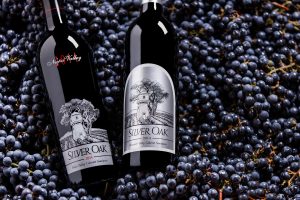
Silver Oak
Highlights: The greenest of the green, Silver Oak is a LEED Platinum certified family-owned winemaking business with Living Building status and a raft of eco-friendly accolades.
Silver Oak was called “California’s Most Eco-Conscious Winery” by The San Francisco Chronicle, won the California Green Medal Award for Leadership in Sustainability in 2019, and in April 2020, the Silver Oak Alexander Valley winery was certified as a Living Building by the International Living Future Institute. This means that the building gives more than it takes, creating a positive impact on the human and natural systems that interact with them. Silver Oak’s winery is only the 26th building in the world to receive full accreditation and the only manufacturing facility of any kind to ever to receive the recognition.
Silver Oak’s Napa Valley and Alexander Valley wineries are also the world’s first production wineries to achieve Platinum certification from LEED (Leadership in Energy and Environment Design), the highest certification available from the U.S. Green Building Council. The company also boasts a number of other LEED Platinum certifications for various parts of the business.
This family-owned, multi-generational winery has long had sustainability in mind from soil to bottle. Their approach has helped reduce irrigation needs by 86% and indoor water use by 26% at their Oakville winery. That winery also houses nearly 1500 solar panels, which produce half its energy needs, and in Alexander Valley the 2,595 solar panel array produces 105% of energy needs!
With smart green building techniques, the wineries make use of night-air cooling, thick insulation, and natural lighting to regulate temperature and reduce the need for energy-guzzling air-conditioning and cellar lighting. There are also electric vehicle charging stations at both wineries, so you should probably stop to ‘recharge’ on any road-trip through California.
Other green strategies employed by Silver Oak include using salvaged lumber for wood siding in building projects, which they calculated reduced total project embodied carbon by 3%. They also used reclaimed oak barrels to create the winery’s main staircase, and materials used for the interior underwent rigorous testing to ensure limited emissions over the life span.
As for the wines, Silver Oak began in the 1970s with the vision to focus on varietal, Cabernet Sauvignon, aged exclusively in American oak and intended to cellar for decades to come. The inaugural 1962 vintage saw just 1,000 cases made, and that dedication to Cabernet Sauvignon continues today. In the last few decades, however, Silver Oak has acquired or created new brands including Twomey, Timeless, and Ovid, with Pinot Noir and Sauvignon Blanc now part of the family cellar.
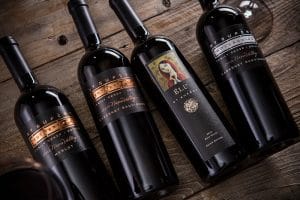
St. Supéry
Highlights: Award-winning winery and vineyards with a clear commitment to sustainability, including using solar power, promoting biodiversity, and strict sourcing policies.
St. Supéry won a Green Medal in the Environment category at the 2018 Sustainable Winegrowing Leadership Awards, and for good reason. Achieving Napa Green Land certification in 2008 and Napa Green Winery certification in 2012, St. Supéry has more than 1,595 acres of land, two thirds of which they leave untouched, so as to promote biodiversity.
The winery has installed more than 100 bird boxes in their vineyards to encourage Western bluebirds, owls, and other birds to make their homes at St. Supéry. This is just one part of the natural approach the company takes to pest control, with the birds helping to eat mosquitoes, gophers, and other critters that cause vine-killing diseases.
St. Supéry has a Green Team dedicated to supporting employees in making greener choices. The company has a strict purchasing policy of only using materials that are at least 50% post-consumer waste and encourages carpooling for employees.
Between 2015 and 2018, the winery reduced water usage by half, and solar panels cover 80% of the company’s electricity usage, helping to save 923 tons of CO2. St. Supéry also recycles all winemaking, bottling, and winery materials.
A culinary garden was planted in 2012 and is fed with compost created from winemaking pomace. The garden provides fresh food for meals served at the winery and for local restaurants and farmers markets.
St. Supéry Estate Vineyards and Winery is also involved in philanthropic endeavors, including local, national, and international community outreach. The company is particularly engaged with health awareness and children’s charities.
All in all, St. Supéry is a winery that has long demonstrated a clear commitment to sustainable winery and farming operations with a mandate to protect the land and environment for future generations.
In addition to making a wide range of delicious wines, St. Supéry also make craft brandy. And if you’re having a hard time deciding on any one wine, check out their wide range of tasting kits – perfect for a backyard picnic!
Further reading
Well, there you have it, 5 of our favorite sustainable wines to enjoy with family and friends.
Want to do more research on what makes wine sustainable? Check out our blog post on the difference between biodynamic and organic wine.
Also check into Summerhill Wines from the Okanagan area of British Columbia, Canada. Summerhill Wines are certified organic and Demeter biodaynamic, are a Certified B Corp, and follow sustainable permaculture and environmentally respectful practices in their full operations.
https://www.summerhill.bc.ca/
Hi Donna,
Thanks for mentioning Summerhill Wines. I’m a big fan! Especially as I live in BC and love the Okanagan. With this piece we were pretty much sticking to US wines, but for anyone in Canada, I’d definitely support your Summerhill Wines recommendation!
Leigh